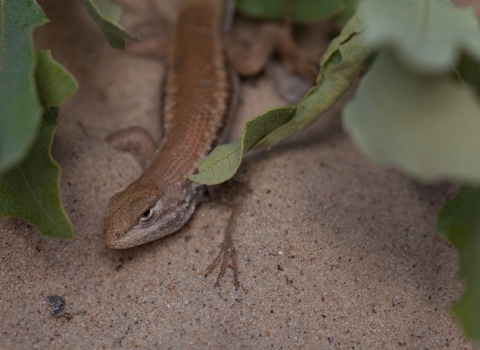Today, the U.S. Fish and Wildlife Service, elected officials and partners came together at the Roger Williams Park Botanical Center in Providence, Rhode Island, to celebrate ten years of urban conservation through the Providence Urban Wildlife Conservation Partnership.
Since 2013, the Providence Urban Wildlife Conservation Partnership has served as a national leader and catalyst, working closely with a variety of local partners and organizations to broadly reach underserved communities. Through collaboration, the Partnership improves vital urban wildlife habitat, provides world-class environmental education opportunities, and expands access to outdoor recreation for residents.
Providence, a city with a metropolitan population of approximately 1.6 million people, is one of the most ethnically diverse cities in the country. The Partnership leverages the city’s network of more than 120 existing parks and greenspaces to inspire residents with a sense of wonder for the nature found in their own communities.
“The Providence Urban Wildlife Conservation Partnership is looked to as an example for other urban wildlife conservation partnerships across the country. Through a shared vision we are working toward healthy, clean environments where wildlife and people thrive. Congratulations to all the amazing partners, and the people of Providence, it is incredible to see this vision becoming a reality.” said Cynthia Martinez, Chief of the National Wildlife Refuge System.
This year will also mark the fifth anniversary of Providence’s designation as an Urban Bird Treaty city. The Urban Bird Treaty program supports Providence partners in conserving birds and their habitats while providing opportunities for community engagement through bird-related recreation, education, and conservation efforts.
“We are so proud of everything the Providence Urban Wildlife Conservation Partnership has accomplished over the last decade. From restoring natural habitat in urban areas to training educators and providing bilingual outdoor programing, the partnership is a model for community-led conservation,” said Wendi Weber, Northeast Regional Director for the U.S. Fish and Wildlife Service.
The Service’s Urban Wildlife Conservation Program improves lives by expanding access to green space, education and outdoor recreation for Americans living in and around cities. Program members work to clear social and historical barriers and foster new connections that advance conservation and strengthen communities.
For more information on the U.S. Fish and Wildlife Service’s work toward building long-term, meaningful relationships with urban communities through conservation, visit https://www.fws.gov/program/urban-wildlife-conservation.
To learn more about the Providence Urban Wildlife Conservation Partnership and Urban Bird Treaty city, visit https://www.fws.gov/refuge/ninigret/initiatives


